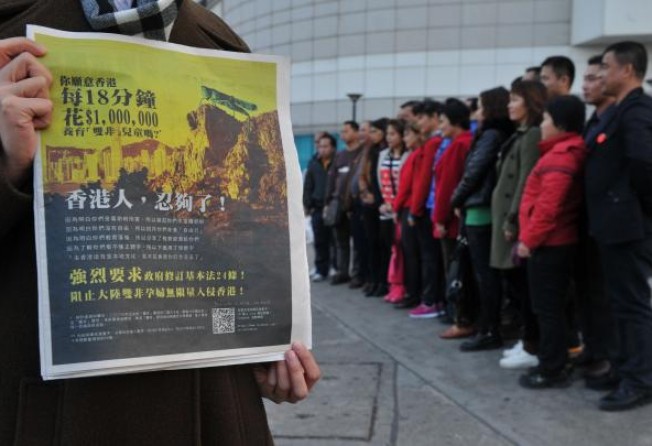Time for an honest debate about Hong Kong's place in the nation
Stephen Vines says the vitriol directed at mainlanders signals a need

I was born in London, north London to be exact, where most people are close to perfect and certainly more intelligent than those in south London. I have lived in three countries other than Britain and, in each, I discovered regional prejudices, ethnic differences and linguistic divides.
Yet what is so remarkable about the current debate in Hong Kong over the influx of mainlanders is how little people acknowledge that the response to this mingling of people from different places is unremarkable and similar to what happens elsewhere.
Thus, we have idiots calling mainlanders locusts, foul-mouthed louts and the like. This is hardly pleasant, but it is the way of the world.
Hong Kong has long experience of tuning the collective antennae to differences among its population: the majority Cantonese have often expressed views on those from Shanghai; the Chiu Chow people find themselves subject to negative associations even though they come from part of Guangdong province; and those originating from the Indian subcontinent will have little difficulty telling you the racial epithets aimed in their direction.
What is different about the widespread disparaging of people from the mainland is the abnormal political context in which it is taking place.
First, some history. The existence of a colony in Hong Kong produced almost 150 years of apartness from the rest of China. Although it is now distinctly unfashionable to say so, the relative lack of contact between Hong Kong and the rest of China bred something approaching envy north of the border and a sense of superiority to the south.
Now the roles are reversed as political power in Hong Kong firmly resides north of the border and part of the influx of people from the mainland consists of wealthy individuals who can buy things locals cannot.
The politically correct response is to say that, now Hong Kong is united with the motherland, Hong Kong people should embrace their compatriots with open arms and do their very best to fit in with the new order.
The reality is that, while integration is gathering pace, some aspects of it alarm people here who fear the evaporation of the advantages they have enjoyed. To the north, the unique nature of Hong Kong is viewed with suspicion and disdain, as it is believed that the people are haughty, severely compromised by a colonial mentality and generally not prepared to accept their status as being Chinese.
Of course, these sweeping characterisations are not universal. However, it is overall impressions that matter and things are turning ugly.
It might be thought that, in these circumstances, the role of community leaders would be to encourage greater harmony and provide reassurance where troublemakers seek to ferment unease.
This is not happening because our local leaders are helplessly compromised. Their bosses in Beijing expect them to speak endlessly about further integration and to stress their loyalty to the ruling party. Meanwhile, the bosses' representatives down here send alarmist reports back suggesting that those who disagree with government policy are basically unpatriotic and un-Chinese. Thus, instead of helping to overcome misunderstandings and distrust, political leaders exacerbate the problem.
Hong Kong needs a grown-up debate about its place in the nation, to ease some of the tension. Suspicion and mistrust will not disappear, but there is no need for this to overshadow relations between people who, at the end of the day, all come from the same country.
Come to think of it, even I believe that there must be some people from south London who are not that bad.
Stephen Vines is a Hong Kong-based journalist and entrepreneur